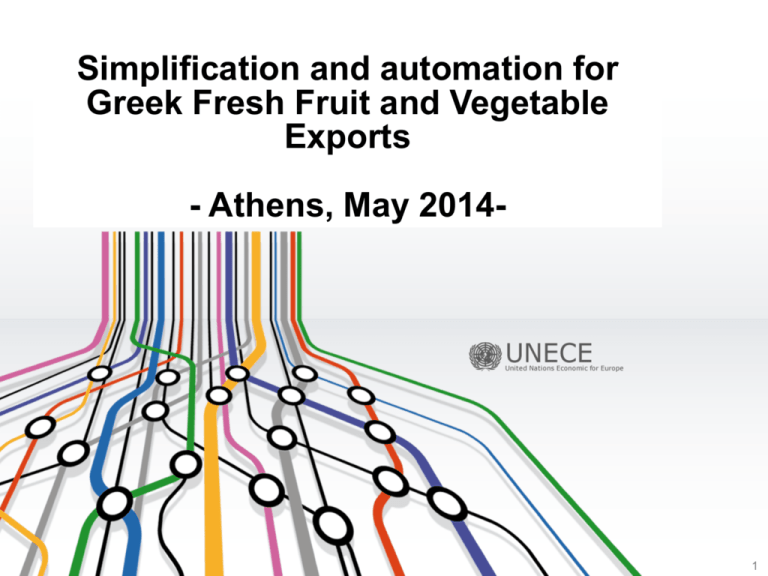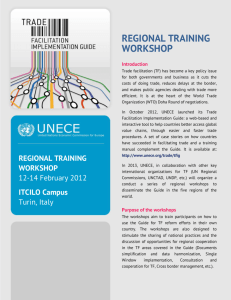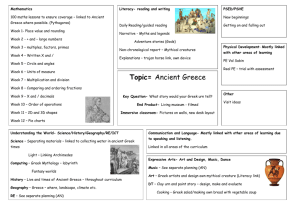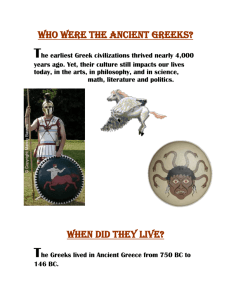00_Opening
advertisement

Simplification and automation for Greek Fresh Fruit and Vegetable Exports - Athens, May 2014- 1 UNECE: Who we are and what we do UN Economic Commission for Europe (UNECE): North America, Europe, Central Asia, Western Asia and Caucasus Focal point in the UN system to develop standards and best practice for trade facilitation The United Nations Centre for Trade Facilitation and electronic Business (UN/CEFACT) develops policy recommendations, standards, guidelines Simplified and harmonized trade documents, processes and information flows throughout the supply chain 2 UNECE: How we support Greece Greek Trade Facilitation Roadmap 2014: Holistic, nation wide and ambitious trade facilitation effort by the Greek administrations and enterprises Global policy objective, 25 specific actions, key performance indicators and timelines Institutional support: Ministries and Industry associations through Operational Steering Committee, working groups and top level policy support UNECE supports the Greek Gouvernent in the implementation of the Roadmap Project funded by the European Commission and coordinated with the TFGR Focs areas: Project management support, BPA, Single Window and paperless trade, Customs reform through WCO, agriculture Trade Facilitation 3 Roadmap facilitating Greek Agriculture Exports Specific support for Agri-food exports (lead: MRDF) Approved agri-food exporter scheme Electronic exchange of information between MRDF and Customs (SW) for electronic CC Busines Process Analysis (Kiwi, Feta, Olive,..) Simplification of business processes and legislation Change managment: Dialogue between stakeholders, workshops and study tours Support for all exports Customs: Automation (ICISNet), reduced and targeted inspections, simplified procedures, document dematerilzation, .. Policy support for TF, collaboration between Government Agrencies and private sector.. 4 The Greek Roadmap does deliver! • Greek Express Carriers: “We have seen more change in the last 1 1/2 years than in the 20 years before” • World Bank DoingBusiness.org: Greece international ranking in trade facilitation competitiveness improved 17 ranks in one single year* • World Bank LPI: Greece international ranking in logistics comeptence improved from 68 to 40 and in Customs from 68 to 27** Greece is doing better but there is still a long way to go!! * Source: WB DoingBusiness.org 2013 report; http://www.doingbusiness.org/data/exploreeconomies/greece ** Source: WB Logisitcs Performance Index (LPI): comparison 2011 to 2014 http://lpi.worldbank.org/international/scorecard/radar/200/C/GRC/2014/I/OEC/2014/C/ITA/2014 5 Minister Tsaftaris on policy objectives for Greek Agriculture «Openess of agriculture trade supply chains is a strategic choice for Greece» A main pillar for growth and employment in Greece Synergies between Agriculture and Tourism The Minister highighted tools and achievements of the trade facilitation reform: Approved trader scheme, risk based controls, Business Process Analysis, automation and electronic data exchange withcustoms Source: 24 April 2014; http://www.minagric.gr/index.php/el/the-ministry2/grafeiotypou/deltiatypou/2353-dt240414b 6 Outlook: UNECE strategy for a Smarter Food Single Window UNECE Concept of a Smarter Food Single Window: Increase competitiveness and market access for agriculture exports through use of state of the art Information Technology, logistics concepts and trade facilitation standards. Pillars: Holistic national agrifood facilitation strategy Electronic information exchange and management Business Process Analysis of the supply chain Risk management techniques collaboration between the stakeholders 7 One step at a time.. Currently working on: electronic exchange of CC between MRDF and Customs using the new MRDF risk managment tool Potential for improvment of the Greek FF&V exports in comparison with practice in other EU member states Main objectives of todays workshop: Information: Were are we? What is current state of activities? Bottlenecks: What are the bottlenecks in the export process? Where do we loose time and create costs? Were are the risks for traders and Governments? Solutions: What could we do to improve? Were is the best cost/benfit ratio? How can we realize synergies? Best practice: How do other EU member states address these issues? 9 Thank You Markus Pikart, UNECE Markus.Pikart@unece.org 10








